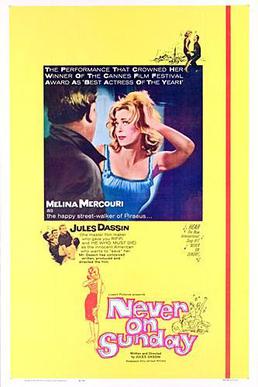Never on Sunday
 By 1960 Jules Dassin was living in Greece with actress Melina Mercouri. His film Never on Sunday could be seen as a valentine both to her and to his new home, or it could be seen as a parallel to how shortsighted Americans who think they know better try to "fix" other cultures.
By 1960 Jules Dassin was living in Greece with actress Melina Mercouri. His film Never on Sunday could be seen as a valentine both to her and to his new home, or it could be seen as a parallel to how shortsighted Americans who think they know better try to "fix" other cultures.Set in Piraeus, a port city, Mercouri plays Ilya, the classic prostitute with a heart of gold. She is a free-spirited woman who lives only for pleasure, choosing her clients based on how much she likes them. She resists living the life of the other hookers in town, who are forced to live in apartments owned by the town crime boss.
Enter Homer Thrace, played by the director, an American Grecophile who fancies himself a philosopher. He is enchanted by Ilya, but sees her as a symbol of why Greek civilization failed, not as a woman. He puts forth the Aristotlean theory that happiness comes from the mind, not from physical pleasures, and endeavors, Pygmalion-style, to transform Ilya from a hedonistic wild-child into a cultured lady of refinement. It is not giving anything away to reveal that this effort does not ultimately succeed, and Homer sees the error of his ways.
Though this film has its charms, a little goes a long way. I've never been to Greece, but I have a feeling that what we see is the Greek Tourist Board version of the country, similar to the way The Quiet Man presented Ireland as a land full of lovable eccentrics. The film's attitude about prostitution is certainly very European (the only character who raises a stink about it is Homer himself, the prudish American) but the characters are so one-dimensional that any statement this film tries to make is undercut. Also, Homer is such a pill that about a third of the way through the film you just want him to leave town.
The film is best known today for the titular theme song, which won an Academy Award, and the bouzouki-filled soundtrack. For a few years Greek culture was prevalent in film, as a few years later Zorba the Greek would come along and forever cement the image of Greek men as people who just want to drink and dance. Not that there's anything wrong with that.


Comments
Post a Comment